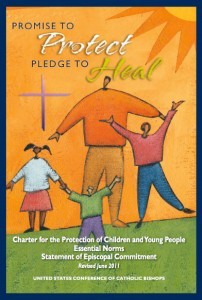All diocesan employees, volunteers must comply with guidelines, including background check
The Diocese of Knoxville, which currently is going through an annual audit of its Child Protection policies and procedures, is emphasizing the need for everyone in the Church who may come in contact with minors and vulnerable adults to be in compliance with established guidelines.
As part of the, adopted by the U.S. Conference of Catholic Bishops in 2002, dioceses across the country agreed to follow rules for protecting youth and vulnerable adults from abuse. To accurately monitor compliance, participating dioceses undergo regular audits. Diocesan policy requires background checks for all employees and volunteers who will be in contact with children and vulnerable adults.
Diocese of Knoxville Chancellor Sean Smith said all diocesan employees and volunteers must comply with the program for providing a safe environment.
Specifically, Deacon Smith said volunteers are defined as those who have the opportunity to be alone with or in proximity to either a minor under the age of 18 or a vulnerable adult.
Volunteers would include catechists, members of choirs where minors are present, extraordinary ministers of Holy Communion if they serve vulnerable adults, ushers if they may come in contact with minors, youth ministers and coordinators, interns and students 18 and over, teachers, chaperones, scout leaders and volunteers, coaches, drivers, and others who may be in contact with or proximity to minors or vulnerable adults.
Marcy Meldahl, director of the diocese’s Employment Services and Benefits Office, said there are three key components to being approved for employment or volunteer positions:
• Individuals must agree to a background check.
• They must read the policies and procedures on sexual misconduct.
• They must attend a regularly scheduled session called Protecting God’s Children held in parishes throughout the diocese.
“Refusal to do any one of these things prohibits people from working or volunteering within the diocese,” Mrs. Meldahl said.
Background checks look for convictions involving any felony or misdemeanor, a department of motor vehicles check for anyone driving in an official capacity, and a credit check for anyone handling money, according to Deacon Smith, who also is the Child and Youth Protection Officer for the diocese.
Bishop Richard F. Stika is on the U.S. Conference of Catholic Bishops’ Committee for the Protection of Children and Young People.
Mrs. Meldahl said every diocese undergoes an audit annually. Sometimes its an on-site audit, and any parish or school is subject to it.
Information from background checks is only seen by Deacon Smith in his position as chancellor.
Deacon Smith said no one is exempt from the background check, child protection (Virtus) training course or from reading and signing the policy and procedure.
“The charter requires we have a policy and procedure for sexual misconduct and it applies to all priests, deacons, men and women religious, employees and volunteers who could be or have the potential to be alone with a minor or vulnerable adult,” Deacon Smith said. “We look for all criminal activity in our background checks.”
Since the charter was adopted, Deacon Smith said compliance with the guidelines in the diocese has been very good. But he said recently a few potential volunteers have refused to undergo a background check because the process involves providing a Social Security number and they feared identity theft even though the organization providing the background checks has strict protective controls in place.
“Overall, we have excellent cooperation with our priests, deacons, employees and volunteers. But lately because of the identity theft scare, we have had some hesitation and declines by volunteers to do background checks, so we can’t let them become volunteers,” he said.
Deacon Smith said any decline in volunteers is unfortunate, but the Child Protection policy must be enforced. “At the end of the day, our No. 1 priority is protecting the children. We’re proactively screening every person we believe would be alone with a minor or vulnerable adult to determine their suitability through our screening process,” he said.
Mrs. Meldahl said each parish has been reviewing its records to confirm compliance with the Child Protection Charter.

